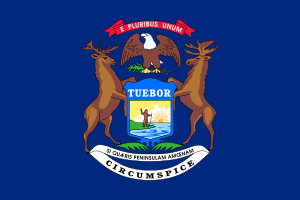Paul W. Shafer
Paul Werntz Shafer (April 27, 1893 – August 17, 1954) was a politician and judge from Michigan.
.jpg)
Biography
Shafer was born in Elkhart, Indiana on April 27, 1893,[1] the son of John McClellan Shafer and Sarah (Werntz) Shafer.[2] His parents relocated their family to Three Rivers, Michigan, where he was raised and attended the public schools.[1] Shafer was a student at Ferris Institute (now Ferris State University), Big Rapids, Michigan, and studied law by correspondence with the Blackstone Institute of Chicago, Illinois.[1] He was a reporter, editor, and publisher of newspapers in Elkhart, Indiana, Battle Creek, Michigan, and Bronson, Michigan. [1] He was a member of the Indiana Army National Guard in 1916 and 1917, and served on the border with Mexico during the Pancho Villa Expedition, but was rejected on medical grounds for service in World War I.[3]
From 1929 to 1936, Shafer served as a municipal judge in Battle Creek.[1] In the Republican Party primary elections of September 1936 for Michigan's 3rd congressional district, Shafer defeated the incumbent Verner W. Main.[4] Shafer went on to be elected to the 75th United States Congress and to the eight succeeding Congresses, serving from January 3, 1937 until his death.[1]
Together with John Howland Snow, Representative Shafer authored "The Turning of the Tides," an exposé on the education system of the United States, which was delivered in the House of Representatives on March 21, 1952. In it, the authors took the position that the education system was an alien collectivist (socialist) philosophy, much of which came from Europe, crashed onto the shores of our nation, bringing with it radical changes in economics, politics, and education, funded—surprisingly enough—by several wealthy American families and their tax-exempt foundations. (See also "The Deliberate Dumbing Down of America," by Charlotte Thomson Iserbyt).
Shafer was injured in an automobile accident in March 1940 while traveling in Columbiana County, Ohio. He suffered head and spinal injuries and spent several weeks being treated in both Salem and Youngstown before being flown back to Michigan from Akron aboard an army plane.[5]
Death and burial
He died on August 17, 1954 in Washington, D.C., two weeks after being re-nominated in the Republican primary election to the 84th Congress.[1] He was interred in Memorial Park Cemetery, Battle Creek, Michigan.[1]
Family
In 1917, Shafer married Ila P. Mack of Detroit; they had no children.[6]
See also
- List of United States Congress members who died in office (1950–99)
References
- Paul Werntz Shafer, Late a Representative, p. 5.
- Paul Werntz Shafer, Late a Representative, p. 10.
- Paul Werntz Shafer, Late a Representative, pp. 5, 12.
- Paul Werntz Shafer, Late a Representative, p. 12.
- "Injured Congressman Starts Journey Home". Youngstown Vindicator. April 6, 1940. P 5. (Retrieved via Google News 10/25/10).
- Paul Werntz Shafer, Late a Representative, p. 14.
Sources
Books
- Paul Werntz Shafer, Late a Representative. Washington, DC: US Government Printing Office. 1955.
External links
- United States Congress. "Paul W. Shafer (id: S000277)". Biographical Directory of the United States Congress.
- Paul W. Shafer at The Political Graveyard
- Paul W. Shafer at Find a Grave
| U.S. House of Representatives | ||
|---|---|---|
| Preceded by Verner Main |
United States Representative for the 3rd Congressional District of Michigan January 3, 1937 – August 17, 1954 |
Succeeded by August E. Johansen |

